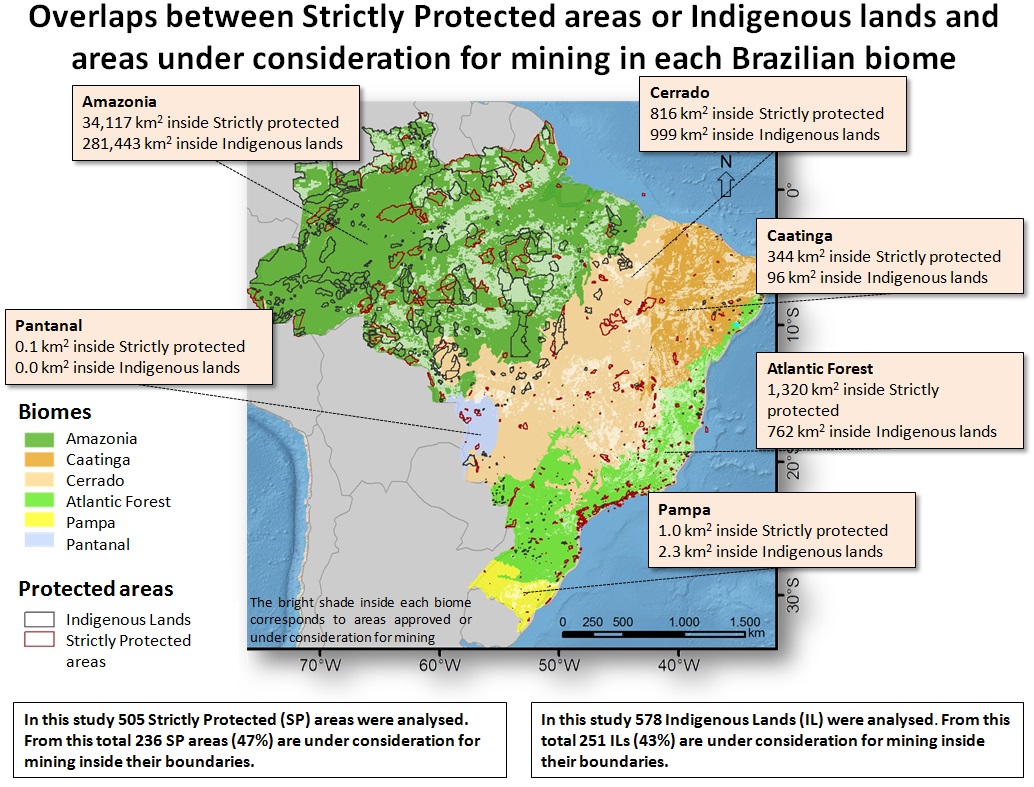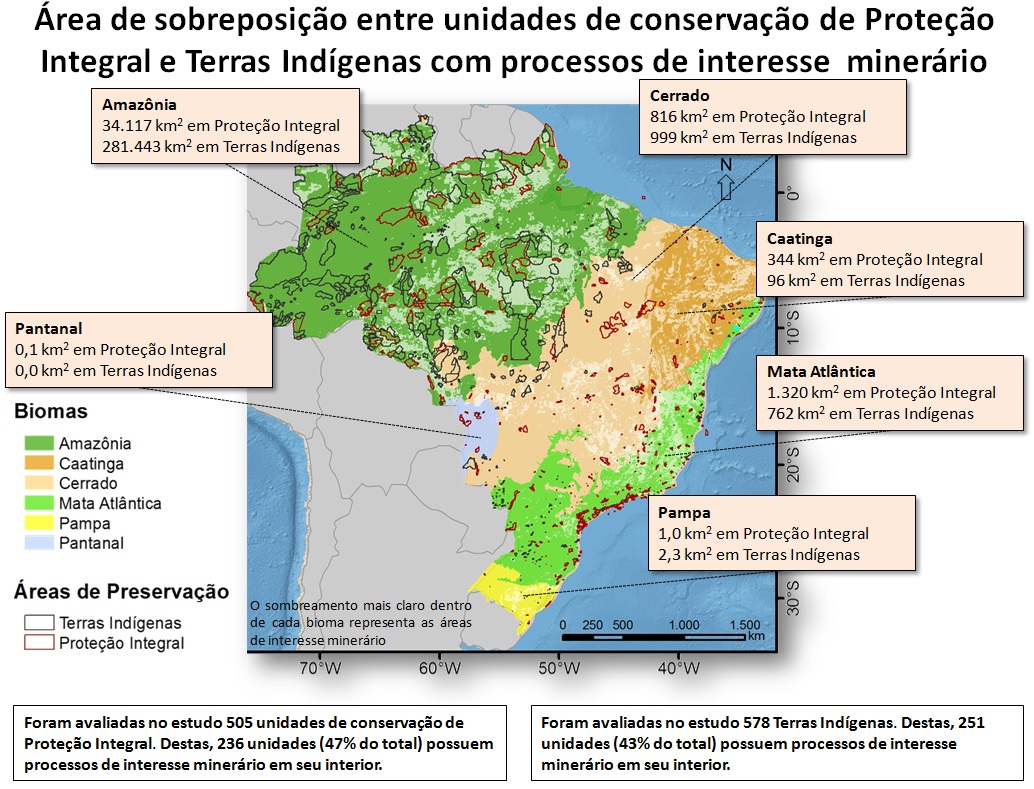|
Credits: André Lima and Luiz Aragão (INPE) Data Souce: DNPM and MMA, these data were compiled from these sources for the study publish in Science. For more information on the database, please follow this link. Brazil´s globally significant ecosystems could be exposed to mining and dams if proposals currently being debated by the Brazilian Congress go ahead, according to researchers publishing in the journal Science this week.
The new report by a group of Brazilian and British researchers comes in the wake of Brazil´s recent presidential elections. It warns that new legislation could pose a serious threat to protected areas, weakening Brazil’s international status as an environmental leader. One of the proposals of particular concern is the call to open up 10% of the most strictly protected areas to mining. In a new analysis, the research shows that at least 20% of all Brazil´s most strictly protected areas and reserves for indigenous people overlap with areas that have been registered as under consideration for mining. In addition, many of the river systems associated with protected areas will be influenced by the construction of large hydroelectric dams. The threat that this mining and hydropower poses to Brazil’s ecosystems is not trivial. Areas of registered interest for mining in Amazonia, for instance, include 34,117 km2 that are currently classified as strictly protected areas – including National Parks, Biological Reserves and Wildlife Refuges. This is equivalent to an area the size of Switzerland. The situation is worse for amazonian indigenous lands, 28% of which, or 281,443 km2, overlap with areas of registered mining interest – an area larger than the whole of the UK or the state of São Paulo. In recent years Brazil has enjoyed increasing recognition as a world leader in combatting environmental destruction. Brazil´s protected area network is the largest in the world, while improved environmental governance in private lands has contributed to an 80% reduction in the rate of deforestation in the Brazilian Amazon over the last decade. Yet these new proposals could threaten these recent successes and undermine Brazil’s reputation. Dr Joice Ferreira, a scientist at Brazil´s agricultural research institute, Embrapa, and lead author of the study, said: “The purpose of this analysis is not to say that Brazil´s development should not benefit from its abundant natural resources, but that we should not squander our hard-won record of success and leadership in favor of fast-tracked and poorly planned development projects that leave a long legacy of environmental damage. It is possible to manage our development in a more sustainable way.” Co-author Dr Jos Barlow, a researcher at Lancaster University and a visiting professor in Brazil, said: “Rather than exploiting protected areas for short-term gains, Brazil should treasure them for the long-term benefits they can provide to society. The recent water shortages in the south east of Brazil emphasize the importance of protecting native vegetation across the country.” The authors of the study also warn that the proposals for minimizing and mitigating the environmental damage of large-scale development projects are so inadequate that even if only a fraction of these mining concessions were approved then the impacts could be enormous, especially in Brazil´s most threatened ecosystems. Dr. Luiz Aragão a co-author of the study from Brazil´s federal space agency, INPE and the University of Exeter said: “Our concern is that even if the proposed mitigation actions were put in place they are oversimplified because they fail to take account of the indirect effects of mega-projects. “These projects can involve thousands of workers and lead to rapid local population growth. This, combined with new roads and access routes, is a recipe for the emergence of new deforestation frontiers.” explains Luiz. The study highlights the fact that these worrying changes reflect an important shift in the support shown by Brazil´s federal government to environmental protection. These concerns come on the back of other recent changes, including the partial dismantling of Brazil´s protected area system to make way for development – with some 44,100 km2 lost since 2008 due to downsizing or abolishment - and the weakening of the Forest Code that gave an amnesty to landowners who deforested illegally in the past. “Beyond the conservation and stewardship of its own biodiversity and environmental resources, so vital to the wellbeing of its citizens, Brazil plays a vital role in motivating and supporting the adoption of more sustainable development trajectories around the world,” said Toby Gardner, of Stockholm Environment Institute, one of the authors of the study who has worked in the country for more than a decade. “Yet this standing is now in jeopardy.” Dr Joice Ferreira said: “The newly elected government has the chance to set the record straight and point Brazil firmly on a path of sustainable development. The authors of this report call on President Dilma and her government to ensure that individual development initiatives are subject to a comprehensive, socially inclusive, evidence-based and long-term cost-benefit analysis that compares potential environmental and social impacts against alternative development options. And also to ensure that Brazil´s renowned protected area network is given the resources it needs to manage our ecosystems sustainably. “Above all we ask the Government to guarantee that important decisions regarding the management of Brazil´s natural resources involve the full and democratic participation of Brazilian society.”
2 Comments
Créditos da figura: André Lima e Luiz Aragão (INPE) Fonte de dados: DNPM e MMA De acordo com pesquisadores que publicam na revista Science desta semana, os ecossistemas do Brasil, de importância mundialmente reconhecida, podem estar ameaçados se propostas, para mineração em unidades de conservação e para o estabelecimento de hidrelétricas, atualmente em debate no Congresso Nacional, seguirem em frente.
O novo estudo de pesquisadores da EMBRAPA e do INPE, além de outros colaboradores brasileiros e britânicos é publicado logo após as eleições do Brasil. Ele adverte que as mudanças propostas podem representar uma séria ameaça para as áreas protegidas, enfraquecendo a posição internacional do Brasil como um líder ambiental. Uma das propostas, que causa especial preocupação, consiste em um projeto de lei para abrir 10% das áreas de proteção integral à mineração. Em uma análise inédita, a pesquisa mostra que pelo menos 20% da área de todas as reservas estritamente protegidas e terras indígenas do Brasil coincidem com as áreas que foram oficialmente registradas como de interesse para a mineração. Além disso, muitos dos sistemas hídricos associados com áreas protegidas serão influenciados pela construção de grandes usinas hidrelétricas. A sobreposição entre áreas protegidas e interesse mineral ou hidrelétrico ocorre principalmente na Amazônia. A ameaça que a mineração e usinas hidrelétricas representa para os ecossistemas do Brasil não pode ser desprezada. As áreas com interesse registrado para a mineração na Amazônia, por exemplo, perfazem 34.117 km2 das áreas atualmente classificadas como áreas de proteção integral - incluindo os Parques Nacionais , Reservas Biológicas e refúgios de vida silvestre. Isto é equivalente a uma área do tamanho da Suíça. A situação é pior para as terras indígenas amazônicas, das quais 28%, ou 281.443 km2 tem sobreposição com áreas de interesse de mineração registrado - uma área maior do que o Reino Unido ou o estado de São Paulo. Nos últimos anos o Brasil tem tido um crescente reconhecimento como líder mundial no combate à destruição ambiental. O país tem a maior rede de áreas protegidas do mundo e avanços na governança ambiental, incluindo em terras privadas, tem contribuído para uma redução de 80% na taxa de desmatamento na Amazônia brasileira durante a última década. No entanto, essas novas propostas podem ameaçar esse sucesso e minar a reputação ambiental do Brasil. A Dra. Joice Ferreira, pesquisadora da Embrapa e primeira autora do estudo, disse: "O propósito desta análise não é dizer que o Brasil não deve se desenvolver e beneficiar de seus recursos naturais abundantes, mas que não devemos ameaçar nossa reputação duramente conquistada de sucesso e liderança em favor de projetos de desenvolvimento pouco planejados que deixam um longo legado de danos ambientais. É possível gerenciar o nosso desenvolvimento de forma mais sustentável". Dr. Luiz Aragão, coautor do estudo e pesquisador do INPE disse: "Nossa preocupação é que, mesmo se propostas de mitigação fossem efetivadas, estas tendem a ser muito simplistas porque não consideram os efeitos indiretos de mega-projetos. Esses projetos, normalmente, mobilizam milhares de trabalhadores e levam a um rápido crescimento da população local. Isto, combinado com novas estradas e vias de acesso é uma receita para o surgimento de novas fronteiras de desmatamento”. A solução, segundo os autores do estudo, é inicialmente se conscientizar que a manutenção das funções ambientais, através da preservação de ecossistemas únicos, é parte do desenvolvimento e não um competidor. Segundo, é ter a garantia por parte dos tomadores de decisão que as iniciativas de desenvolvimento sejam sujeitas a uma análise técnica de custo-benefício, socialmente inclusiva e de longo prazo, baseada em evidências científicas que comparem os potenciais impactos ambientais e sociais contra opções alternativas de desenvolvimento, para garantir o cumprimento da Constituição Federal (Art. 225). Os autores ressaltam que “este estudo é relevante para salientar que decisões importantes a respeito da gestão dos recursos naturais do Brasil devem ser feitas com a participação plena e democrática da sociedade brasileira". |
AuthorLuiz Aragão Archives
July 2019
Categories |



 RSS Feed
RSS Feed
